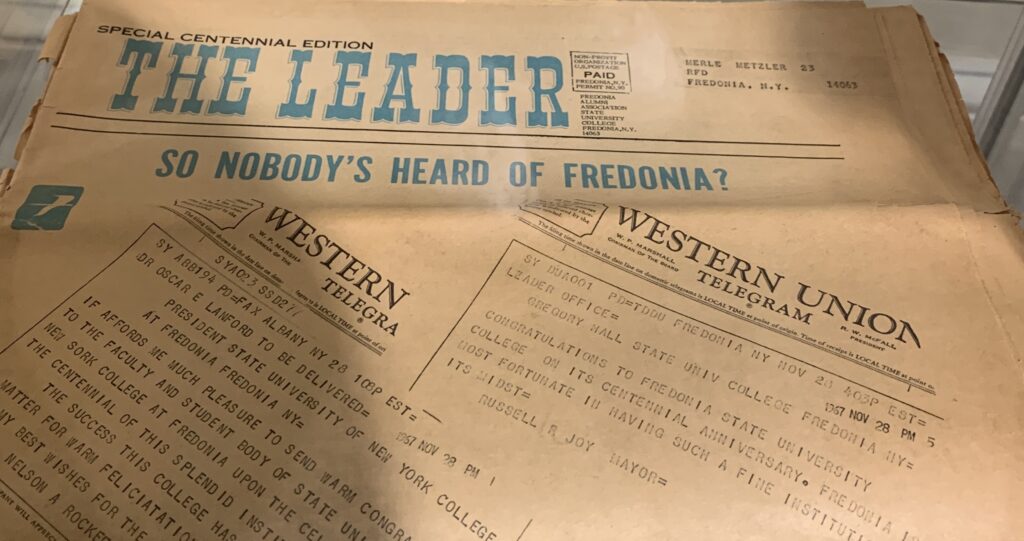LEE PYE
Staff Writer

The Fredonia area is intensely rich with history, and the Barker R. Darwin Museum is a perfect place to step back in time. When one steps back in time, they should be sure to grab a newspaper along the way.
The new exhibit in that museum, The Fredonia Un-Censored, displays old newspapers from Fredonia and Chautauqua County’s history, mainly consisting of the no-longer running newspaper The Fredonia Censor. Most papers in the exhibit came from the last of the editors from the newspapers, who donated the newspapers to be preserved.
The Barker Museum, located at 7 Day Street in the village of Fredonia, NY, was founded in 1874 by the Women’s Christian Temperance Union, well after the creation of some of the newspapers displayed in the new exhibit.
The Fredonia Censor founder was Henry C. Frisbee, who created the newspaper in 1824. The museum models some of his personal possessions, such as his walking cane. Frisbee’s wife was also one of the founders of the Women’s Christian Temperance Union, which founded the museum, connecting Frisbee even closer to the museum that honors him today.
The museum holds more, such as the oldest newspaper printed in Chautauqua County, the “Chautauque Gazette,” the first volume printed in 1817.
Times change, and newspapers change. Now, for example, The Leader has multiple staff members collectively searching for stories and editing the paper until it comes to life. Frisbee did it all on his own. He got news from local talk from the nearby tavern, town gossip and other newspapers, so the sources were not necessarily reliable or up-to-date.
The newspaper collection spans from 1817 to 1982 with a print from the Career Express.
The collection grows to some other papers, like The Leader.
The Leader began in May 1892 at the Fredonia Normal School, which would eventually become SUNY Fredonia. The newspaper was originally called The Normal Leader. For the first year, The Normal Leader was all handwritten.
The current curator of the Barker Museum, Maxwell Walters, holds much of the information that’s been given, making a tour of the museum jam-packed with local history.
“In this case, I had been doing research on The Fredonia Censor in particular since August of last year,” he said. “Research goes on, slowly at first, and we drew up the timeline for it, and prioritized a list of what needs to get done in order for this to open on the exact day we want[ed] it to.”
The exhibit, from the idea, took about eight months. During that time, they collected newspapers and artifacts from their collection, loans from Daniel A. Reed Library, Archives & Special Collections in Reed Library, The Dunkirk Observer and private collections. After extensive research, they collected all of the artifacts they saw fit in the museum, which took about two months. Finally, Walters and his team prepared the museum for its new exhibit, which took another month.
Walters said, “To see it come together, by taking the actual objects we have in the collection or are local, then finding a way to display them so that it’s just as interesting to people as it is to me who has spent a lot of time looking at it, that’s the really exciting part.”
“The Fredonia Un-Censored” holds newspapers and artifacts from Frisbee, printing plates, cameras that were used to take pictures for the newspapers, medicine bottles along with their print stamps and, of course, lots of newspapers. Jacob Fox, a student intern at the Barker R. Darwin Museum, said, “My favorite part about how we set this up is seeing all the connections from the research. Not only seeing the print aspects of it but the journalism aspects of it. It’s a lot of seeing the things you’ve been researching and looking into sort of coming to life, it’s very satisfying.”
The flier for the new exhibit states, “Discover who and what filled the columns of the Fredonia Censor (1821-1964) and its rival newspapers in Fredonia and Dunkirk. During its 143-year run, the Censor provided information about contemporary events both global and local; today, its original pages provide insights into the daily lives, perspectives and experiences of people from the past, enriching our understanding of local history and its broader significance.”
The Fredonia Un-Censored will be open to the public on Saturday, April 27, and will stay open throughout the summer.
The Museum is looking for student volunteers and offers several internships each year. Applications can be sent to curator@barkermuseum.org.
